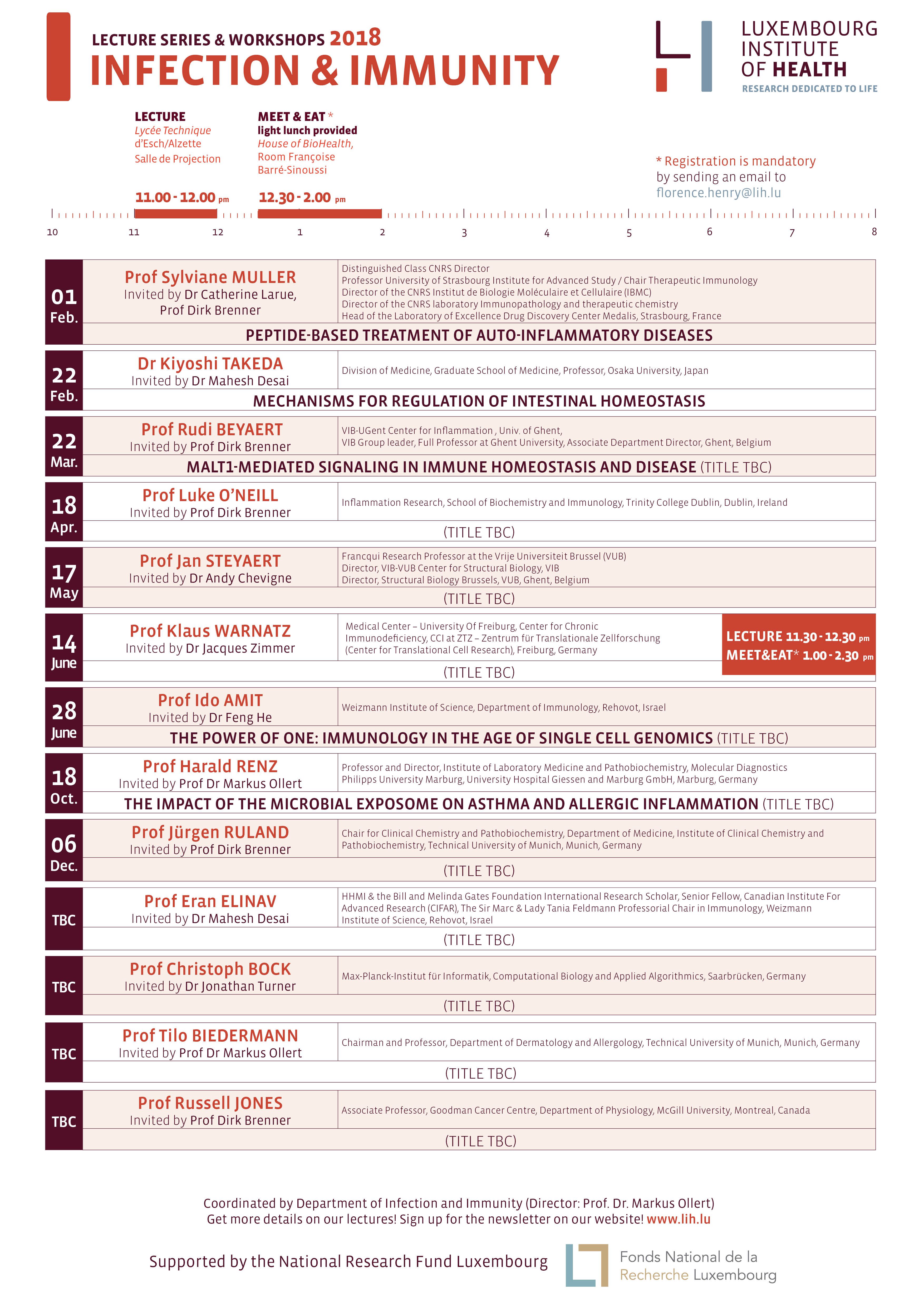Lecture Series "Infection & Immunity" - Prof Jan Steyaert - "NANOBODY-ENABLED INVESTIGATION OF GPCR TRANSMEMBRANE SIGNALLING: FROM STRUCTURE TO FUNCTION TO DRUGS"
17/05/2018 11:00 to 17/05/2018 14:00 (Europe/Luxembourg)
Esch/Alzette,
Luxembourg
Speaker
Prof Jan Steyaert is Francqui Research Professor at the Vrije Universiteit Brussel (VUB), Director, VIB-VUB Center for Structural Biology, VIB, Director, Structural Biology Brussels, VUB, Belgium

ABSTRACT
Polytopic membrane proteins such as GPCRs are dynamic proteins that exist in an ensemble of functionally distinct conformational states. Crystallogenesis typically traps the most stable low energy states, making it challenging to obtain agonist bound active-state structures of GPCRs. Stabilization of an active conformation of a GPCR can be achieved in different ways. The most physiologic approach is to use a native signaling partner such as a G protein. An alternative to using a G protein is to identify another binding protein that can stabilize the same conformational state. Antibodies evolved to bind to a diverse array of protein structures with high affinity and specificity. Last years, we generated Nanobodies that selectively recognize an active state of the human beta2 adrenergic receptor (β2AR). Such Nanobodies that faithfully mimic the effects of G protein binding were used to obtain diffraction quality crystals and to solve the very first structure of an active agonist-bound state of the human 2 adrenergic receptor, the M2R muscarinic receptor or the μ-opioid receptor. More interesting, we also identified nanobodies that stabilize the β2AR•Gs complex. One of these nanobodies was used to obtain the high-resolution crystal structure of this complex, providing the first view of transmembrane signalling by a GPCR. Currently we are applying such conformational nanobodies for better drug design. Nanobodies are the small (15 kDa) and stable single domain fragments harbouring the full antigen-binding capacity of the original heavy chain only antibodies that naturally occur in Camelids. Because of their unique threedimensional structure, nanobodies have access to cavities or clefts on the surface of proteins. The nanobody platform has the competitive advantage to other recombinant scaffold libraries in that large numbers (109) of fragments harbouring the full antigen-binding capacity of genuine in vivo matured antibodies can be screened for high affinity binders in a couple of days, allowing one to fully exploit the humoral response of large mammals against native antigens.
SCHEDULE
11:00 - 12:00 : LECTURE
Lycée Technique d'Esch/Alzette - Salle de projection audiovisuelle
12:30 - 14:00 : 'meet & eat'
House of BioHealth
Room Françoise Barré-Sinoussi
Registration required for the 'Meet & Eat' - send us an email.
About the Lecture & Workshop series - Infection & Immunity
The LIH Lecture Series and Workshops in Infection and Immunity, supported by the FNR, are gathering internationally recognised speakers to address topics around Infection and Immunity. Twelve lectures will be organised in 2018, followed by workshops especially dedicated to early-stage researchers. Please find here the full programme for 2018.
Attendance to the lectures and workshops are free of charge. Should you be interested in registering for the workshops, please feel free to do so by sending us an email.

